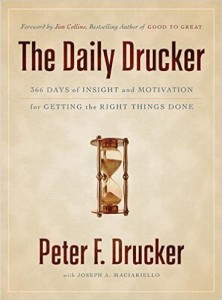Everyone wants to be a better leader. Despite how fast the world is changing, there is timeless wisdom to be gleaned from practical historical experts.
Management guru Peter Drucker’s innovative insights on social economies were ahead of his time. His breadth of knowledge regarding the evolving workplace has informed many of the world’s most influential and successful leaders—from charities to mega corporations—around the world, including the team here at OneHope.
Believe me, I could have easily given you at least 50 important Drucker principles from the notes on my phone, but I edited them down to the six I see being the most important for leaders in 2016:
 Know who you are. “Whenever people are on the road to success,” Drucker said, “they tend to think of repositioning as something they do if they’re a failure. But I would say that you ought to reposition when you’re a success, because that’s when you can afford it.”
Know who you are. “Whenever people are on the road to success,” Drucker said, “they tend to think of repositioning as something they do if they’re a failure. But I would say that you ought to reposition when you’re a success, because that’s when you can afford it.”
 Keep outcomes in mind. “The only worthy goal is to make a meaningful life out of an ordinary one.” Drucker recommends setting one’s sights on achievements that really matter—that will make a difference in the world—and to set them far enough ahead of current achievements that the journey will be demanding but worth the effort. [easy-tweet tweet=”Make your life your endgame”]
Keep outcomes in mind. “The only worthy goal is to make a meaningful life out of an ordinary one.” Drucker recommends setting one’s sights on achievements that really matter—that will make a difference in the world—and to set them far enough ahead of current achievements that the journey will be demanding but worth the effort. [easy-tweet tweet=”Make your life your endgame”]
 Don’t let planning get in the way of opportunity. “Opportunity comes in over the transom,” Drucker insisted, and that means one has to be flexible, ready to seize the right opportunities when they come. “Too much planning can make you deaf to opportunity. Opportunity knocks, but it knocks only once. You have to be ready for the accident.”
Don’t let planning get in the way of opportunity. “Opportunity comes in over the transom,” Drucker insisted, and that means one has to be flexible, ready to seize the right opportunities when they come. “Too much planning can make you deaf to opportunity. Opportunity knocks, but it knocks only once. You have to be ready for the accident.”
 Stick to your lifeline “If you don’t respect a job, not only will you do a poor job of it, but it will corrupt you, and eventually it may even kill you,” Drucker said. “For example, ninety-nine percent of all physicians should not become hospital administrators. Why? Because they have no respect for the job. They’re physicians and they feel that hospital administration is a job for clerks.” Knowing what you value and what you don’t can keep you from making some bad choices.
Stick to your lifeline “If you don’t respect a job, not only will you do a poor job of it, but it will corrupt you, and eventually it may even kill you,” Drucker said. “For example, ninety-nine percent of all physicians should not become hospital administrators. Why? Because they have no respect for the job. They’re physicians and they feel that hospital administration is a job for clerks.” Knowing what you value and what you don’t can keep you from making some bad choices.
 Never stop doing what you love. “My definition of success changed a long time ago,” Drucker said. “I love doing consulting work and writing—I regularly lose track of time when I’m doing those things. But finishing well, and how I want to be remembered, those are the things that matter now. Making a difference in a few lives is a worthy goal. Having enabled a few people to do the things they want to do—that’s really what I want to be remembered for.”
Never stop doing what you love. “My definition of success changed a long time ago,” Drucker said. “I love doing consulting work and writing—I regularly lose track of time when I’m doing those things. But finishing well, and how I want to be remembered, those are the things that matter now. Making a difference in a few lives is a worthy goal. Having enabled a few people to do the things they want to do—that’s really what I want to be remembered for.”
 Finish well. I see more and more people who make it to their mid-forties or beyond, and they’ve been very successful,” Drucker said. “They’ve done very well in their work and career, but in my experience, they end up in one of three groups.
Finish well. I see more and more people who make it to their mid-forties or beyond, and they’ve been very successful,” Drucker said. “They’ve done very well in their work and career, but in my experience, they end up in one of three groups.
1) One group will retire; they usually don’t live very long.
- The second group keeps on doing what they’ve been doing, but they’re losing their enthusiasm, feeling less alive.
- The third group keeps doing what they’ve been doing, but they’re looking for ways to make a contribution. They feel they’ve been given a lot and they’re looking for a chance to give back. They’re not satisfied with just writing checks; they want to be involved, to help other people in a more positive way.” And they’re the ones, Drucker said, who finish well.[1]
 I recommend that every leader—whether seasoned or aspiring—add the Daily Drucker to their reading list.
I recommend that every leader—whether seasoned or aspiring—add the Daily Drucker to their reading list.
- Tips to build a leadership Dream Team
- Leadership: Set your people up to win with a transition plan
- Teach the next generation to lead with influence by John C. Maxwell
Druckerisms and Peter Drucker quotes excerpted from http://druckersociety.at/index.php/peterdruckerhome/commentaries/bob-buford?start=1




